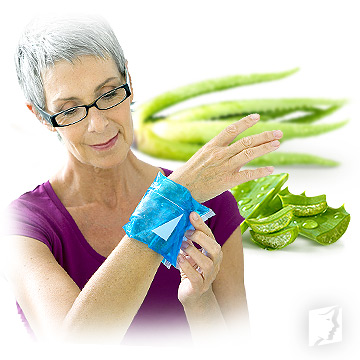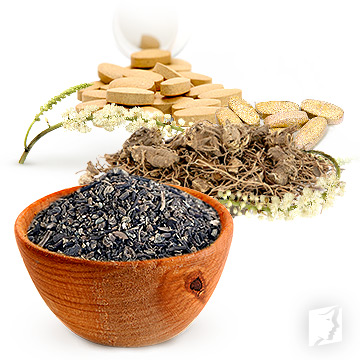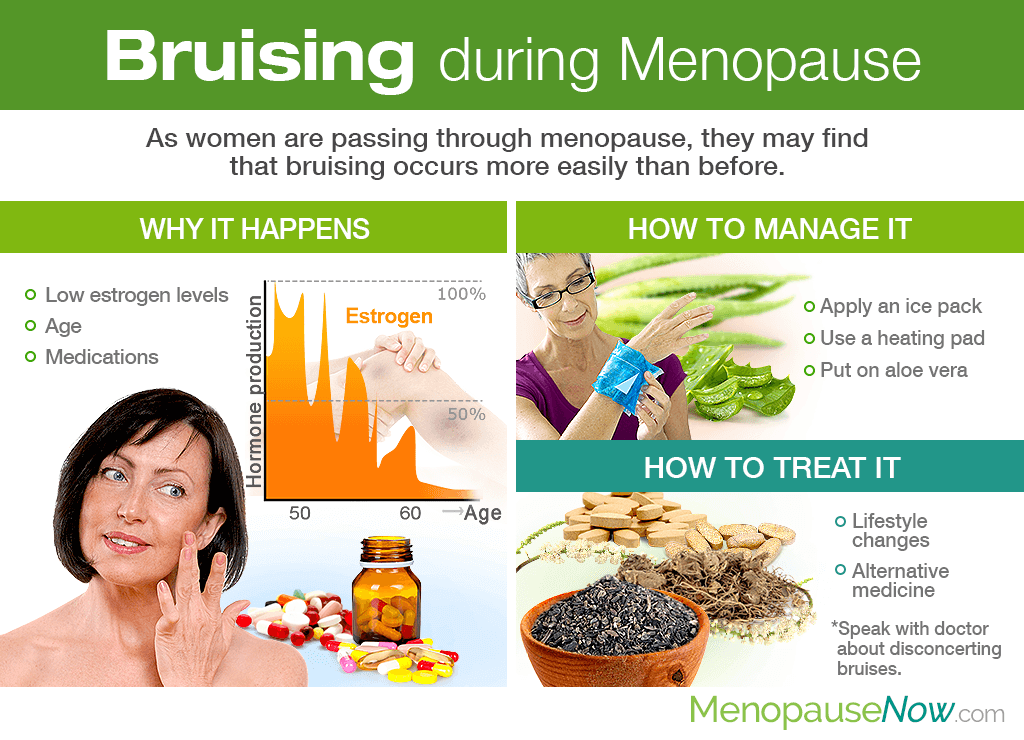A slight bump up against a desk or table can wind up in unsightly, rainbow-colored bruises for many women as they transition out of their reproductive stage, something that didn't naturally occur in their younger years. Luckily, there is an explanation behind it all.
Discover all about bruising during menopause below, including why it happens, effective management options, and treatments for long-term success.
Why It Happens

Menopause is marked by a time of drastic hormonal fluctuations as women's ovarian functions are winding to an end. The principal reproductive hormones affected are estrogen and progesterone.
Estrogen has been scientifically found to contribute to the prevention of skin aging in several ways, including increasing skin collagen content to maintain thickness. As such, when estrogen levels drop, the skin becomes thinner, and bruises are more easily formed.
Getting bruised easily during menopause can also be due to age as fat tissues naturally begin to thin, and blood vessels lose elasticity, making them more prone to breaking, causing bruises.
Moreover, certain medications can increase the risk of bruising, including, but not limited to, anticoagulants, non-steroidal anti-inflammatory drugs, or corticosteroids.
How to Manage It

Some of the best management tips for before and after bruising during menopause include the following:
Apply sunscreen. Applying a broad-spectrum sunscreen with a potency of at least SPF 30 during all seasons will prevent further thinning of the skin, which can lead to bruising.
Put on makeup. If the bruises are visible and bothering you, applying foundation can be a quick fix for the short-term.
Apply an ice pack. As soon as a bruise develops, and before 48 hours have passed, women should apply an ice pack for 15 minutes. Prevent direct contact with the skin by placing a cloth in between the skin and ice pack.
Use heat. Once the initial 48 hours have passed, women may apply a heating pad or a soaked, warm cloth to the bruise several times a day as seen necessary.
Elevate. Elevating the bruised area so that it's above the heart - if possible - helps reduce pressure as well as drains fluids from the area.
Use aloe vera. Aloe vera gel can be applied topically to the bruise to reduce any associated pain and inflammation.
How to Treat It

As can be read, there are effective techniques to instill in order to manage bruises. However, long-term relief from their reoccurrence involves tackling the underlying cause, which is most often hormonal imbalance.
Menopause symptom treatments that function as much for bruising as they do for other menopause symptoms are focused around an optimized diet, regular exercise, and healthy habits for ultimate endocrine system health.
To boost efforts, women are encouraged to pair lifestyle changes with alternative medicine that is time-tried to foster hormonal health, including phytoestrogenic herbal supplements and hormone-regulating supplements:
Phytoestrogenic herbal supplements. This type of alternative medicine, including black cohosh, is infamous for containing stronger concentrations of phytoestrogens, plant-based estrogens that act as natural estrogen in the body. Because they introduce outside hormones into the body, they are preferred for short-term use under the supervision of a certified herbalist.
Hormone-regulating supplements. This alternative medicine option, including Macafem, works with the body to encourage natural hormonal production by stimulating the endocrine glands. Hormone-regulating supplements are safer for long-term use as they do not introduce exogenous hormones into the body.
It is important to note the once hormonal balance occurs, the skin's elasticity and thickness should improve so that women do not bruise as easily.
Bruises that do not go away within a few weeks or return with no apparent cause may need medical attention.
Key Takeaways
Due to drastic hormonal fluctuations, especially those of estrogen, women are more likely to bruise easily during menopause. Being prone to bruising during menopause can also be attributed to age or certain medications that increase the symptom's risk. Although managing bruises includes useful methods such as applying makeup, ice packs, heating pads, or aloe vera gel, treating the underlying cause of hormonal imbalance proves most successful. To do so, women are encouraged to combine lifestyle changes along with alternative medicine for improved results. Keep track of bruise history as those that prove disconcerting may need medical attention.
Sources
- American Academy of Dermatology. (n.d.). Caring for your skin in menopause. Retrieved August 7, 2019, from https://www.aad.org/public/skin-hair-nails/skin-care/skin-care-during-menopause
- Cleveland Clinic. (2017). Bruises: Management and Treatment. Retrieved August 7, 2019, from https://my.clevelandclinic.org/health/diseases/15235-bruises/management-and-treatment
- Harvard Health Publishing. (2017). Why do I bruise more easily as I age? Retrieved August 7, 2019, from https://www.health.harvard.edu/staying-healthy/why-do-i-bruise-more-easily-as-i-age
- Shah, M.G. & Maibach, H.I. (2001). Estrogen and skin. An overview. American Journal of Clinical Dermatology, 2(3), 143-150. doi: 10.2165/00128071-200102030-00003
- Stevenson, S. & Thornton, J. (2007). Effect of estrogens on skin aging and the potential role of SERMs. Clinical Interventions in Aging, 2(3), 283-297. Retrieved August 7, 2019, from https://www.ncbi.nlm.nih.gov/pmc/articles/PMC2685269/

